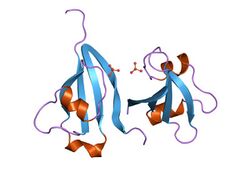Biology:Cyclin-dependent kinase regulatory subunit family
| CKS | |||||||||
|---|---|---|---|---|---|---|---|---|---|
 ckshs1: human cyclin dependent kinase subunit, type 1 in complex with phosphate | |||||||||
| Identifiers | |||||||||
| Symbol | CKS | ||||||||
| Pfam | PF01111 | ||||||||
| InterPro | IPR000789 | ||||||||
| PROSITE | PDOC00728 | ||||||||
| SCOP2 | 1cks / SCOPe / SUPFAM | ||||||||
| |||||||||
In molecular biology, the cyclin-dependent kinase regulatory subunit family is a family of proteins consisting of the regulatory subunits of cyclin-dependent protein kinases.
In eukaryotes, cyclin-dependent protein kinases interact with cyclins to regulate cell cycle progression, and are required for the G1 and G2 stages of cell division.[1] The proteins bind to a regulatory subunit, cyclin-dependent kinase regulatory subunit (CKS), which is essential for their function. This regulatory subunit is a small protein of 79 to 150 residues. In yeast (gene CKS1) and in fission yeast (gene suc1) a single isoform is known, while mammals have two highly related isoforms. The regulatory subunits exist as hexamers, formed by the symmetrical assembly of 3 interlocked homodimers, creating an unusual 12-stranded beta-barrel structure.[2] Through the barrel centre runs a 12A diameter tunnel, lined by 6 exposed helix pairs.[3] Six kinase units can be modelled to bind the hexameric structure, which may thus act as a hub for cyclin-dependent protein kinase multimerisation.[2][3]
This family includes the CKS1B and CKS2 genes in mammals.
References
- ↑ "p13suc1 acts in the fission yeast cell division cycle as a component of the p34cdc2 protein kinase". EMBO J. 6 (11): 3507–14. November 1987. doi:10.1002/j.1460-2075.1987.tb02676.x. PMID 3322810.
- ↑ 2.0 2.1 "Human CksHs2 atomic structure: a role for its hexameric assembly in cell cycle control". Science 262 (5132): 387–95. October 1993. doi:10.1126/science.8211159. PMID 8211159.
- ↑ 3.0 3.1 "The Cdk-associated protein Cks1 functions both in G1 and G2 in Saccharomyces cerevisiae". Genes Dev. 7 (5): 822–32. May 1993. doi:10.1101/gad.7.5.822. PMID 8491379.
External links
- Eukaryotic Linear Motif resource motif class DOC_CKS1_1
 |

